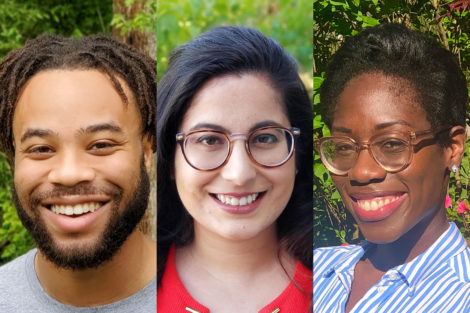June 3, 2020 – The coronavirus pandemic, which has pushed so many people physically apart, brought together two unlikely friends, Adjoa Anyane-Yeboa and Sofiya Deych. Now the two look forward to the day when they can meet in person for a cup of coffee.
Anyane-Yeboa, MPH ’20, and Deych, a senior who lives in an apartment at Roxbury Tenants of Harvard (RTH), connected regularly by phone this spring as part of a Harvard T.H. Chan School of Public Health course called Community-Based Participatory Research (CBPR). The original plan was for students to meet with RTH directors and one or two senior residents, get a tour of the mixed-income apartment complex, and learn about housing and health issues in the Mission Hill neighborhood. Such in-person meetings are a key component of CBPR, in which researchers and community members collaborate to improve health and reduce health disparities.
COVID-19 meant that the plan had to change.
Karen Gately, executive director of RTH, was worried about seniors at the complex, who make up roughly a third of all RTH tenants and who’d been isolated in their apartments since the city of Boston’s stay-at-home advisory went into effect in mid-March. Gately asked CBPR course instructors Ra’Shaun Nalls, director of community engagement at Harvard Chan School, and Jocelyn Chu, assistant director of field practice, if the students could reach out to seniors individually. Nalls and Chu agreed, and directed students to chat with seniors about their lives—including their reflections on coping during other tough times, such as economic depressions or wars, and on how living in RTH has shaped their experiences. The students wrote up the interviews as memoirs that will be part of a larger project as RTH plans a celebration marking the housing development’s 50-year anniversary (1969-2019), said Nalls.
“I think there was initial disappointment among our teaching team and the students when we all heard that the Spring 2 session was going online,” said Chu. “It is already challenging to teach community-based participatory research in eight weeks, let alone via Zoom. We had also lost access to our greatest teaching tool—the neighborhood of Mission Hill. However, due to the quick pivoting and graciousness of our RTH partners, all was not lost.”
The students worked in pairs. Anyane-Yeboa and Kyla Tucker, MPH ’21, learned about Deych’s immigration to the U.S. from Uzbekistan and her former career as a teacher. “At this time especially, elderly people need to talk to somebody,” said Deych. “The phone calls were very useful, very nice. I was so happy.” Anyane-Yeboa said the phone calls helped her “realize the power of just connecting with somebody. Loneliness and its impact on public health was a big issue before the pandemic, and the pandemic has only compounded these problems in seniors.”
Ruhi Nath, MPH ’21, and Saamon Legoski, MPH ’20, had a series of phone calls with Israel Tselnik, whose family immigrated to the U.S. about 30 years ago from the former Soviet Union to escape anti-Semitism. Nath said their conversations underscored a key aspect of community-based participatory research that was emphasized in class—building equitable partnerships.
“We talked a lot in class about letting community partners determine the goals of research, and not letting the researchers drive the conversation as much,” said Nath. “While this project was less about research as such, I think it was a great example of how we could use those principles to let another person drive the conversation and figure out what is most important to them.”
Adhering to that strategy—letting another person drive the conversation—led to a somewhat surprising discovery for Justin Morgan, a doctoral student in population health sciences. Morgan and Hye Young Choi, MPH ’21, were assigned to speak with Theresa Parks, a longtime resident of RTH and one of its founders. Before their conversations, Morgan had assumed that Parks would be feeling isolated. But that wasn’t the case. Parks said that people had been checking in with her every day.
“Imagine if I had l launched a research project about social isolation for residents of Mission Park and that just wasn’t their problem,” Morgan said. “If anybody else [in the CBPR class] learned that from this exercise, then I think it was incredibly successful.”
Talking with Parks was “a very human experience during a tense time,” said Morgan. He added, “I’m looking forward to meeting her when this is over. I’ve been invited to her house.”
photos courtesy Justin Morgan, Ruhi Nath, Adjoa Anyane-Yeboa
